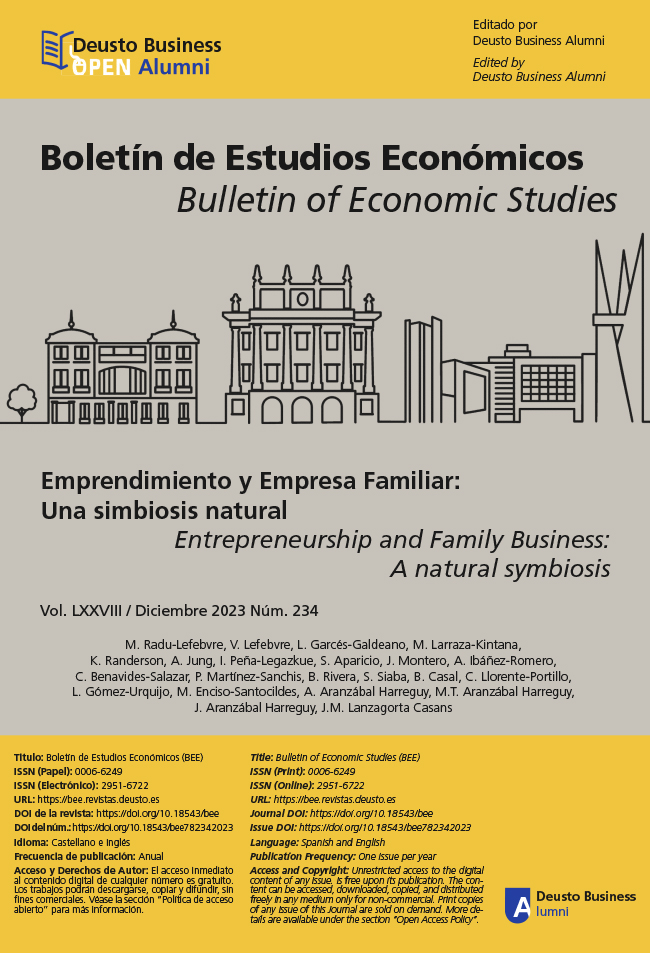Selección de socios y resultado de los equipos emprendedores: ¿Debería quedar todo en familia?
Resumen
La visión del emprendedor como un héroe solitario es común en la sociedad. Sin embargo, muchos negocios nuevos son creados por equipos. De hecho, los negocios emprendidos en equipo tienen mayores probabilidades de obtener beneficios, sobrevivir en el mercado y crecer rápidamente que los emprendidos en solitario. Pero para lograr un mejor resultado a la hora de emprender, no basta con decidir formar un equipo, sino que es necesario también decidir con quién asociarse. Además, siendo la familia un contexto en el cual buscar socios potenciales para formar equipos emprendedores, resulta clave tener en cuenta cómo influye la composición del equipo emprendedor en el caso de nuevos negocios familiares. Este artículo pretende responder a estas cuestiones a partir de lo que dicen la teoría y los datos con el fin de ofrecer orientaciones prácticas para quienes se encuentran iniciando nuevos negocios. En este sentido, hacer una selección cuidadosa del equipo es fundamental, teniendo en cuenta los equipos emprendedores familiares pueden tener algunas limitaciones que hay que considerar.
Recibido: 14 de junio de 2023
Aceptado: 28 de agosto de 2023
Citas
Aparicio. S., Audretsch, D., Noguera, M., & Urbano, D. (2022). Can female entrepreneurs boost social mobility in developing countries? An institutional analysis. Technological Forecasting and Social Change, 175, 121401. https://doi.org/10.1016/j.techfore.2021.121401
Audretsch, D. B. (2021). Have we oversold the Silicon Valley model of entrepreneurship? Small Business Economics, 56(2), 849-856. https://doi.org/10.1007/s11187-019-00272-4
Alvarez, S. A., & Busenitz, L. W. (2001). The entrepreneurship of resource-based theory. Journal of Management, 27(6), 755–775. https://doi.org/10.1016/S0149-2063(01)00122-2
Ben-Hafaïedh, C., & Cooney, T. M. (2017). Introduction. In C. Ben-Hafaïedh & T. M. Cooney (Eds.), Research Handbook on Entrepreneurial Teams (pp. 1–7). Edward Elgar Publishing. https://www.elgaronline.com/view/edcoll/9781784713195/9781784713195.00021.xml
Brannon, D. L., Wiklund, J., & Haynie, J. M. (2013). The Varying Effects of Family Relationships in Entrepreneurial Teams. Entrepreneurship Theory and Practice, 37(1), 107–132. https://doi.org/10.1111/j.1540-6520.2012.00533.x
Cooney, T. M. (2005). Editorial: What is an Entrepreneurial Team? International Small Business Journal, 23(3), 226–235. https://doi.org/10.1177/0266242605052131
Curtin, R. T., & Reynolds, P. D. (2018a). Panel Study of Entrepreneurial Dynamics, PSED I, United States, 1998-2004: Version 1 [Data set]. Inter-University Consortium for Political and Social Research. https://doi.org/10.3886/ICPSR37203.V1
Curtin, R. T., & Reynolds, P. D. (2018b). Panel Study of Entrepreneurial Dynamics, PSED II, United States, 2005-2011: Version 1 (Version v1) [Data set]. ICPSR - Interuniversity Consortium for Political and Social Research. https://doi.org/10.3886/ICPSR37202.V1
Dimov, D. (2010). Nascent Entrepreneurs and Venture Emergence: Opportunity Confidence, Human Capital, and Early Planning. Journal of Management Studies, 47(6), 1123–1153. https://doi.org/10.1111/j.1467-6486.2009.00874.x
Discua Cruz, A., Hadjielias, E., & Howorth, C. (2017). Family entrepreneurial teams. In Research Handbook on Entrepreneurial Teams (pp. 187–207). Edward Elgar Publishing.
Discua Cruz, A., Howorth, C., & Hamilton, E. (2013). Intrafamily Entrepreneurship: The Formation and Membership of Family Entrepreneurial Teams. Entrepreneurship Theory and Practice, 37(1), 17–46. https://doi.org/10.1111/j.1540-6520.2012.00534.x
González-Pernía, J. L., Guerrero, M., Montero, J., & Peña-Legazkue, I. (2019). La travesía desde la concepción de la idea de negocio a la realidad empresarial. In I. Peña-Legazkue, M. Guerrero, J. L. González-Pernía, & J. Montero, Global Entrepreneurship Monitor: Informe GEM España 2018-2019. Editorial de la Universidad de Cantabria. https://doi.org/10.22429/euc2020.024
Grossman, E. B., Yli-Renko, H., & Janakiraman, R. (2012). Resource Search, Interpersonal Similarity, and Network Tie Valuation in Nascent Entrepreneurs’ Emerging Networks. Journal of Management, 38(6), 1760–1787. https://doi.org/10.1177/0149206310383693
Jin, L., Madison, K., Kraiczy, N. D., Kellermanns, F. W., Crook, T. R., & Xi, J. (2017). Entrepreneurial Team Composition Characteristics and New Venture Performance: A Meta–Analysis. Entrepreneurship Theory and Practice, 41(5), 743–771. https://doi.org/10.1111/etap.12232
Kacperczyk, A., & Marx, M. (2016). Revisiting the Small-Firm Effect on Entrepreneurship: Evidence from Firm Dissolutions. Organization Science, 27(4), 893–910. https://doi.org/10.1287/orsc.2016.1065
Kamm, J. B., & Nurick, A. J. (1993). The Stages of Team Venture Formation: A Decision-making Model. Entrepreneurship Theory and Practice, 17(2), 17–27. https://doi.org/10.1177/104225879301700202
Kirzner, I. M. (2008). The alert and creative entrepreneur: A clarification. Small Business Economics, 32(2), 145–152. https://doi.org/10.1007/s11187-008-9153-7
Klotz, A. C., Hmieleski, K. M., Bradley, B. H., & Busenitz, L. W. (2014). New Venture Teams: A Review of the Literature and Roadmap for Future Research. Journal of Management, 40(1), 226–255. https://doi.org/10.1177/0149206313493325
Knight, A. P., Greer, L. L., & De Jong, B. (2020). Start-Up Teams: A Multidimensional Conceptualization, Integrative Review of Past Research, and Future Research Agenda. Academy of Management Annals, 14(1), 231–266. https://doi.org/10.5465/annals.2018.0061
Lazar, M., Miron-Spektor, E., Agarwal, R., Erez, M., Goldfarb, B., & Chen, G. (2020). Entrepreneurial Team Formation. Academy of Management Annals, 14(1), 29–59. https://doi.org/10.5465/annals.2017.0131
Pahnke, A., & Welter, F. (2019). The German Mittelstand: antithesis to Silicon valley entrepreneurship? Small Business Economics, 52(2), 345-358. https://doi.org/10.1007/s11187-018-0095-4
Patzelt, H., Preller, R., & Breugst, N. (2021). Understanding the life cycles of entrepreneurial teams and their ventures: An agenda for future research. Entrepreneurship Theory and Practice, 45(5), 1119-1153. https://doi.org/10.1177/1042258720978386
Pinzón, N., Montero, J., & González-Pernía, J. L. (2022). The influence of individual characteristics on getting involved in an entrepreneurial team: The contingent role of individualism. International Entrepreneurship and Management Journal, 18(3), 1103–1140. https://doi.org/10.1007/s11365-021-00768-0
Pinzón, N., González-Pernía, J. L., & Montero, J. (2021). Differences between entrepreneurial teams and individual entrepreneurs: an international approach. UCJC Business & Society Review, 18(3), 192-235.
Reynolds, P. D., & Curtin, R. T. (Eds.). (2009). New Firm Creation in the United States: Initial Explorations with the PSED II Data Set. Springer. https://doi.org/10.1007/978-0-387-09523-3
Ruef, M., Aldrich, H. E., & Carter, N. M. (2003). The Structure of Founding Teams: Homophily, Strong Ties, and Isolation among U.S. Entrepreneurs. American Sociological Review, 68(2), 195–222. https://doi.org/10.2307/1519766
Santos, S. C., & Neumeyer, X. (2022). Culture and gender in entrepreneurial teams: the effect on team processes and outcomes. Small Business Economics, 58(2), 1035-1050. https://doi.org/10.1007/s11187-020-00432-x
Schjoedt, L., Monsen, E., Pearson, A., Barnett, T., & Chrisman, J. J. (2013). New venture and family business teams: Understanding team formation, composition, behaviors, and performance. Entrepreneurship Theory and Practice, 37(1), 1-15. https://doi.org/10.1111/j.1540-6520.2012.00549.x
Schjoedt, L., & Kraus, S. (2009). Entrepreneurial teams: Definition and performance factors. Management Research News, 32(6), 513–524. https://doi.org/10.1108/01409170910962957
Shane, S., & Venkataraman, S. (2000). The Promise of Entrepreneurship as a Field of Research. Academy of Management Journal, 25(1), 217–226. https://doi.org/10.2307/259271
Shaver, K. G., & Scott, L. R. (1991). Person, Process, Choice: The Psychology of New Venture Creation. Entrepreneurship Theory and Practice, 16(2), 23–45.
https://doi.org/10.1177/104225879201600204
Ucbasaran, D., Lockett, A., Wright, M., & Westhead, P. (2003). Entrepreneurial Founder Teams: Factors Associated with Member Entry and Exit. Entrepreneurship Theory and Practice, 28(2), 107–128. https://doi.org/10.1046/j.1540-6520.2003.00034.x
Van Stel, A., & Storey, D. J. (2004). The Link between Firm Births and Job Creation: Is There a Upas Tree Effect? Regional Studies, 38(8), 893–909. https://doi.org/10.1080/0034340042000280929
Wright, M., & Vanaelst, I. (2009). Introduction. In M. Wright & I. Vanaelst (Eds.), Entrepreneurial teams and new business creation (pp. ix–xli). Elgar.
Xu, F., Kellermanns, F. W., Jin, L., & Xi, J. (2020). Family support as social exchange in entrepreneurship: Its moderating impact on entrepreneurial stressors-well-being relationships. Journal of Business Research, 120, 59-73. https://doi.org/10.1016/j.jbusres.2020.07.033
Zahra, S. A., & Wright, M. (2016). Understanding the Social Role of Entrepreneurship. Journal of Management Studies, 53(4), 610–629. https://doi.org/10.1111/joms.12149
Licencia:
Los trabajos publicados en esta revista desde 2021 se encuentran disponibles bajo la licencia Creative Commons Attribution-NonCommercial 4.0 International - CC BY-NC 4.0. La actual política de acceso abierto de la revista no se aplica a los contenidos previos 2021.
Derechos de los autores/as:
Los autores y las autoras conservan los derechos de autor/a sobre sus trabajos publicados en el Boletín de Estudios Económicos y conceden a éste derechos no exclusivos para la explotación de los trabajos con fines de maquetación, publicación y difusión. Esta licencia permite al Boletín de Estudios Económicos distribuir, reproducir y difundir los trabajos en su plataforma y otros medios, siempre bajo las condiciones descritas en este aviso.
Derechos de los lectores/as:
Los lectores y las lectoras pueden leer, descargar, imprimir, buscar, compartir (copiar, redistribuir o enlazar textos completos), o adaptar (remezclar, transformar y construir a partir del material) el contenido, siempre que:
- No se utilicen los materiales con fines comerciales.
- Se cite adecuadamente el trabajo original, incluyendo el nombre de la persona autora y la fuente.
- Se indique claramente cualquier modificación realizada al contenido original.
El uso comercial de los materiales está prohibido sin el permiso expreso de las personas autoras. Para mayor claridad, se considera uso comercial cualquier actividad que tenga como fin la obtención de beneficios económicos o que implique un intercambio comercial directo.
Condiciones de uso:
El uso del contenido no debe infringir los derechos de otras personas, ni debe ser utilizado de manera que pueda dañar la reputación del/la autor/a o del Boletín de Estudios Económicos.
Responsabilidad por el contenido:
Los/las autores/as son responsables del contenido de sus trabajos y el Boletín de Estudios Económicos no se hace responsable de las opiniones expresadas en los mismos.
Más información:
Política de Acceso Abierto, Licencia y Derechos de Autor/a


.jpg)
.jpg)
.jpg)







